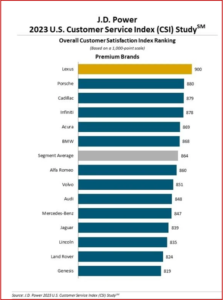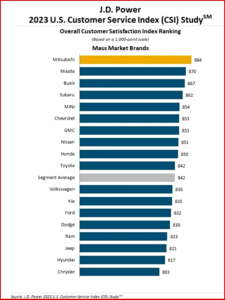
Click for more information.
You can sell EVs, but you can’t service them to the customer’s satisfaction. That’s the bottom line of the results of the J.D. Power 2023 U.S. Customer Service Index (CSI) Study,SM released today. The growing volume of battery electric vehicles (BEVs) being serviced at dealerships is having a negative effect on overall customer service satisfaction, resulting in a year-over-year decline in score for the first time in 28 years. Satisfaction with the service experience declines 2 points to 846 (on a 1000-point scale) in this year’s study. This is not necessarily statistically significant, AutoInformed notes, but it could become a worrisome trend.
“As the electric vehicle segment grows, service is going to be a ‘make or break’ part of the ownership experience,” said Chris Sutton, vice president of automotive retail at J.D. Power. “The industry has been hyper-focused on launches and now these customers are bringing their electric vehicles in for maintenance and repairs. As training programs for service advisors and technicians evolve, EV service quality and customer experience must address both the vehicle and the unique customer needs. The EV segment has the potential to spur massive convenience improvements in how customers service their vehicles—but we’re not seeing the benefits yet.”
Key Observations – J.D. Power 2023 CSI StudySM
- Vehicle recalls drive satisfaction declines: Satisfaction declines 23 points when an owner must bring their vehicle in for a recall repair rather than for traditional maintenance or repair. Recall repair visits also have a negative effect on Net Promoter Score® (NPS)1ratings, a vital metric for owners who share positive recommendations about a business. This is most evident with premium brands as the servicing dealership NPS declines 13 points when customers experience a recall.
- Service departments getting the (text) message: In the 2019 CSI Study, 34% of owners expressed the desire to receive updates through simple text messages rather than phone calls, but only 9% actually did receive texts from dealerships. Now, dealerships have gotten the figurative message, and, as measured in the 2023 study, are now sending simple text messages 21% of the time to update customers vs. making a phone call (17%). The go-to communication method for service departments is now text messaging, as more than half (54%) of Generation X,2Y and Z customers say they prefer it.
- Owners wait even longer for an appointment: Since the 2021 study, the number of days that owners wait for an appointment has increased 1.9 days for premium vehicles and 1.3 days for mass market vehicles. Appointment wait times are now 5.6 days for premium vehicles and 4.8 days for mass market vehicles. Labor, loaner vehicle availability and parts shortages continue to be the catalyst for the increasing amount of time it takes to get a vehicle serviced.
- Owners’ service preferences differ: Owners provide higher trust ratings for franchise dealerships than for aftermarket service facilities for complex repairs (6.14 on a 7-point scale) vs. 5.75 for aftermarket full-service maintenance and repair facilities. When ease of doing business is the primary driver, trust preference swings to aftermarket facilities for maintenance (6.18 vs. 6.11 for dealerships). These findings are based on a battery of similar questions asked both in the CSI Study and in the J.D. Power Aftermarket Service Index (ASI) Study. SM
Highest-Ranking Brands and Segments
Lexus ranks highest in satisfaction with dealer service among all brands for a second consecutive year, with a score of 900. Porsche (880) ranks second in the premium segment, followed by Cadillac (879) and Infiniti (878).
Mitsubishi ranks highest in satisfaction with dealer service among mass market brands for the first time, with a score of 884. Mazda (870) ranks second and Buick (867) ranks third.

Click for more information.
For the first time in the study’s history, model segment rankings are now available to provide even more granularity. “A truck is not a car, and the vehicle needs are going to be different,” Sutton said. “Each vehicle segment has a unique service experience based on customer preferences, demographics and vehicle use, wear and tear, so it’s appropriate to recognize the different journeys that car, SUV and truck customers have in the service experience.”
- Among premium cars, Lexus ranks highest (902), followed by Porsche (880) and Infiniti (878).
- Among premium SUVs, Lexus (900) ranks highest. Cadillac and Porsche rank second in a tie, each with a score of 880.
- Nissan (886) ranks highest in satisfaction among truck brands with a score of 886. Chevrolet (851) ranks second and GMC (843) ranks third.
- In the mass market car segment, Subaru ranks highest (866). Mazda (863) ranks second and Honda (855) ranks third.
- Mitsubishi ranks highest among mass market SUVs/minivans with a score of 884. Mazda (872) ranks second and Buick (867) ranks third.
The 2023 U.S. Customer Service Index (CSI) Study SM is based on responses from 64,248 verified registered owners and lessees of 2020 to 2022 model-year vehicles. The study was fielded from August through December 2022. The J.D. Power auto shopping tool can be found at JDPower.com.
Inevitable Power Footnotes
1Net Promoter,® Net Promoter System,® Net Promoter Score,® NPS,® and the NPS-related emoticons are registered trademarks of Bain & Company, Inc., Fred Reichheld and Satmetrix Systems, Inc.
2J.D. Power defines generational groups as Pre-Boomers (born before 1946); Boomers (1946-1964); Gen X (1965-1976); Gen Y (1977-1994); and Gen Z (1995-2004). Millennials (1982-1994) are a subset of Gen Y.

About Ken Zino
Ken Zino, editor and publisher of AutoInformed, is a versatile auto industry participant with global experience spanning decades in print and broadcast journalism, as well as social media. He has automobile testing, marketing, public relations and communications experience. He is past president of The International Motor Press Assn, the Detroit Press Club, founding member and first President of the Automotive Press Assn. He is a member of APA, IMPA and the Midwest Automotive Press Assn.
He also brings an historical perspective while citing their contemporary relevance of the work of legendary auto writers such as Ken Purdy, Jim Dunne or Jerry Flint, or writers such as Red Smith, Mark Twain, Thomas Jefferson – all to bring perspective to a chaotic automotive universe.
Above all, decades after he first drove a car, Zino still revels in the sound of the exhaust as the throttle is blipped during a downshift and the driver’s rush that occurs when the entry, apex and exit points of a turn are smoothly and swiftly crossed. It’s the beginning of a perfect lap.
AutoInformed has an editorial philosophy that loves transportation machines of all kinds while promoting critical thinking about the future use of cars and trucks.
Zino builds AutoInformed from his background in automotive journalism starting at Hearst Publishing in New York City on Motor and MotorTech Magazines and car testing where he reviewed hundreds of vehicles in his decade-long stint as the Detroit Bureau Chief of Road & Track magazine. Zino has also worked in Europe, and Asia – now the largest automotive market in the world with China at its center.


EV Servicing – First Power CSI Satisfaction Drop in 28 Years
Click for more information.
You can sell EVs, but you can’t service them to the customer’s satisfaction. That’s the bottom line of the results of the J.D. Power 2023 U.S. Customer Service Index (CSI) Study,SM released today. The growing volume of battery electric vehicles (BEVs) being serviced at dealerships is having a negative effect on overall customer service satisfaction, resulting in a year-over-year decline in score for the first time in 28 years. Satisfaction with the service experience declines 2 points to 846 (on a 1000-point scale) in this year’s study. This is not necessarily statistically significant, AutoInformed notes, but it could become a worrisome trend.
“As the electric vehicle segment grows, service is going to be a ‘make or break’ part of the ownership experience,” said Chris Sutton, vice president of automotive retail at J.D. Power. “The industry has been hyper-focused on launches and now these customers are bringing their electric vehicles in for maintenance and repairs. As training programs for service advisors and technicians evolve, EV service quality and customer experience must address both the vehicle and the unique customer needs. The EV segment has the potential to spur massive convenience improvements in how customers service their vehicles—but we’re not seeing the benefits yet.”
Key Observations – J.D. Power 2023 CSI StudySM
Highest-Ranking Brands and Segments
Lexus ranks highest in satisfaction with dealer service among all brands for a second consecutive year, with a score of 900. Porsche (880) ranks second in the premium segment, followed by Cadillac (879) and Infiniti (878).
Mitsubishi ranks highest in satisfaction with dealer service among mass market brands for the first time, with a score of 884. Mazda (870) ranks second and Buick (867) ranks third.
Click for more information.
For the first time in the study’s history, model segment rankings are now available to provide even more granularity. “A truck is not a car, and the vehicle needs are going to be different,” Sutton said. “Each vehicle segment has a unique service experience based on customer preferences, demographics and vehicle use, wear and tear, so it’s appropriate to recognize the different journeys that car, SUV and truck customers have in the service experience.”
The 2023 U.S. Customer Service Index (CSI) Study SM is based on responses from 64,248 verified registered owners and lessees of 2020 to 2022 model-year vehicles. The study was fielded from August through December 2022. The J.D. Power auto shopping tool can be found at JDPower.com.
Inevitable Power Footnotes
1Net Promoter,® Net Promoter System,® Net Promoter Score,® NPS,® and the NPS-related emoticons are registered trademarks of Bain & Company, Inc., Fred Reichheld and Satmetrix Systems, Inc.
2J.D. Power defines generational groups as Pre-Boomers (born before 1946); Boomers (1946-1964); Gen X (1965-1976); Gen Y (1977-1994); and Gen Z (1995-2004). Millennials (1982-1994) are a subset of Gen Y.
About Ken Zino
Ken Zino, editor and publisher of AutoInformed, is a versatile auto industry participant with global experience spanning decades in print and broadcast journalism, as well as social media. He has automobile testing, marketing, public relations and communications experience. He is past president of The International Motor Press Assn, the Detroit Press Club, founding member and first President of the Automotive Press Assn. He is a member of APA, IMPA and the Midwest Automotive Press Assn. He also brings an historical perspective while citing their contemporary relevance of the work of legendary auto writers such as Ken Purdy, Jim Dunne or Jerry Flint, or writers such as Red Smith, Mark Twain, Thomas Jefferson – all to bring perspective to a chaotic automotive universe. Above all, decades after he first drove a car, Zino still revels in the sound of the exhaust as the throttle is blipped during a downshift and the driver’s rush that occurs when the entry, apex and exit points of a turn are smoothly and swiftly crossed. It’s the beginning of a perfect lap. AutoInformed has an editorial philosophy that loves transportation machines of all kinds while promoting critical thinking about the future use of cars and trucks. Zino builds AutoInformed from his background in automotive journalism starting at Hearst Publishing in New York City on Motor and MotorTech Magazines and car testing where he reviewed hundreds of vehicles in his decade-long stint as the Detroit Bureau Chief of Road & Track magazine. Zino has also worked in Europe, and Asia – now the largest automotive market in the world with China at its center.